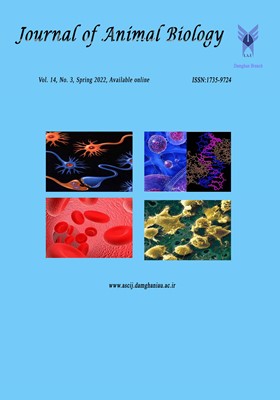Apoptosis induction of Harmine on Human Colon Cancer Cell Line HT29 and Alteration in Apoptotic Genes Expression P53, Bax and Bcl-2
Subject Areas : Journal of Animal Biology
Reyhaneh Chitbandi
1
,
Javad Baharara
2
![]() ,
Maryam Tehranipour
3
,
Maryam Tehranipour
3
1 - Department of Biology, Islamic Azad University, Mashhad Branch, Mashhad, Iran
2 - Department of Biology & Research Center for Animal Development Applied Biology, Islamic Azad University, Mashhad Branch, Mashhad, Iran
3 - Department of Biology, Islamic Azad University, Mashhad Branch, Mashhad, Iran
Keywords: Cytotoxicity, Apoptosis, Colon cancer, Harmine,
Abstract :
Alkaloids have anti-proliferative and apoptotic stimulatory effects on cancer cells. Harmine is also one of the important alkaloids that have been reported to have anticancer effects. The aim of this study was to investigate the effect of Harmine on apoptosis induction in human HT29 colon cancer cell line and expression alteration of apoptotic genes P53, Bax and Bcl-2. For this purpose, HT29 colon cancer cells were treated with different concentrations of harmine (0, 35, 45, 55, 65 μg/ml) for 24 hours. Then the cell viability was assessed using the MTT assay. Nuclear changes and chromatin condensation were investigated by DAPI staining. Also, apoptosis induction was determined by Annexin V-FITC testing and changes in P53, Bax and Bcl-2 genes expression was assessed by using Real Time PCR. The results showed that the concentration of Harmin reduced the viability of HT29 colon cancer cells. Also, the treatment of HT29 colon cancer cells with Harmin caused morphological changes in the cell nucleus, including chromatin condensation of the nucleus, the formation of apoptotic bodies, and the wrinkling of the cell membrane. All of these morphological features indicate apoptosis. The results of the Annexin test also confirmed this finding; with about 57% of the cells undergo apoptosis. On the other hand, the treatment of HT29 cancer cells with Harmin reduced the expression of Bcl-2 and at the same time increased the expression of P53 and Bax and, in general, reduced the ratio of Bcl-2 to Bax. As a result, Harmin can be used to treat colon cancer cells because of its cytotoxicity, which is effective in inhibiting cell prolifration and inducing apoptosis.
_||_


